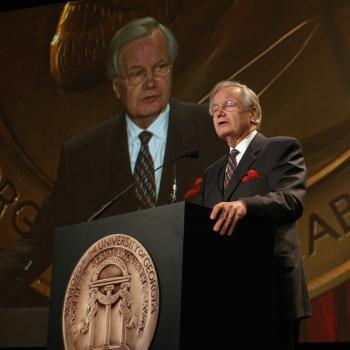
The Christian church in America is struggling. That’s obvious.
- Conservatives are going in one direction and progressives and liberals in another.
- There seems to be no room for compromise, as the recent United Methodist split demonstrated.
- Church membership is plummeting.
- The face of evangelicalism is beginning to change.
- The white population, which has dominated America’s Christian landscape from the beginning, is set to become a minority within the next few years.
What will American Christianity look like in the next few years? Will profound changes in the church eventually destroy Christianity in the U.S? What about the role of evangelicalism? Can non-whites save the struggling church as whites become a minority?
I’m convinced that people of color can, and the changes we’re beginning to see may actually strengthen the church and bring new life to it.
Transforming the Church
A recent CNN story says, There are millions of Black, Latino, African and Asian evangelical Christians who are already profoundly changing America. They represent what one scholar calls the ‘de-Europeanization of American Christianity.’
And these non-White evangelicals will likely not only save the American church but transform the nation’s politics.
So, let’s look at several issues:
- What do we mean by evangelical?
- How is American evangelicalism changing?
- What changes are occurring in religious demographics?
- How are African American, Asian American and Latino churches changing the church?
- In the face of Christianity’s current problems, can non-whites save the struggling church?
Let’s Look at Evangelicalism
We toss the words evangelical and evangelicalism around quite freely, but what do those words really mean? In 21st-century America, you cannot talk about evangelicalism without venturing into politics, but I’m going to try.
The Oxford Dictionary doesn’t even mention politics in its definitions. It defines evangelical as denoting a tradition within Protestant Christianity emphasizing the authority of the Bible, personal conversion, and the doctrine of salvation by faith in the Atonement; a member of the evangelical tradition in the Christian Church.
The National Association of Evangelicals (NAE) explains that evangelicals are serious about the Bible and believe Christ is our Lord and Savior. The word evangelical means the good news, and for evangelicals, it means that the good news is salvation through Christ.
NAE says it embraces diversity. Evangelicals are a vibrant and diverse group, including believers found in many churches, denominations and nations. Our community brings together Reformed, Holiness, Anabaptist, Pentecostal, Charismatic and other traditions.
Historian David Bebbington identifies four primary characteristics of evangelicalism:
- The belief that people need to be transformed through a ‘born again’ experience
- A strong belief in the Bible
- Demonstration of the gospel in missionary efforts
- Emphasis on Christ’s death and resurrection
These distinctives and theological convictions define as – not political, social or cultural trends. In fact, many evangelicals rarely use the term ‘evangelical’ to describe themselves, NAE says.
Let’s Look at Shifting Religious Demographics
The Public Religion Research Institute (PRRI) reported in 2022 that the proportion of white Christians in the U.S. has steadied at 42 percent after declining from 72 percent in 1990. That 42 percent includes evangelical as well as non-evangelical faith traditions.
Of the 42 percent, PRRI said:
- 14 percent are white evangelical Christians
- 14 percent are white non-evangelical Christians
- 13 percent are white Catholics
- The remainder are smaller percentages of Orthodox Christians, Latter-day Saints and Jehovah’s Witnesses.
Another 25 percent is non-white Christian, e.g., African American, Hispanic, Asian American, Native American and multiracial followers of Christ.
The non-partisan PRRI also reports that both major U.S. political parties are predominantly Christian, with Republicans at 85 percent and Democrats at 65 percent. However, The makeup of the Christian coalition within each party is vastly different, the institute says.
The largest Christian groups among Republicans are all white:
- White evangelical Protestants (30%)
- White mainline Protestants (20%)
- White Catholics (18%).
On the Democratic side, the largest groups are:
- Black Protestants (16%)
- Hispanic Catholics (12%)
- White Catholics (10%)
- White mainline Protestants (9%)
Overall, Republicans are:
- 71% white Christians
- 14% Christians of color
Democrats are:
- 24% white Christians
- 38% Christians of color
According to the Brookings Institution, a nonprofit public policy organization, and U.S. Census projections, whites will become a minority 21 years from now, or 2045. That shift will impact religion in the U.S., as well as politics, in significant ways
No wonder many whites – especially white politicians — are fearful.
These stats may make your eyes glaze over, but they go a long way in explaining the current political environment in the U.S. But this post isn’t about politics, so let’s get back to the main question: Can non-whites save the struggling church?
Let’s Look at Changes in Black Churches
Since 2020, the United States has been more divided than ever before. Consequently, the same proved true of the church, says InClub Magazine, which covers black culture.
Deconstruction arose out of a shift in the world that no longer saw in-person church attendance as essential to the everyday lives of people, InClub says. This only further amplified talking heads who were already not favorable to the church to convince people of why they do not need church – the racism, the tainted history, and the role westernized Christianity has played in the disadvantages experienced by black people for centuries.
Sprinkle in some public scandals of popular pastors, leaders, and churches, and you push a community already with plausible cause over the edge of deep suspicion….
But there is hope.
The black-owned InClub Magazine points to several black faith leaders who are giving blacks a reason to believe in church again. It says these leaders are galvanizing their cities and encouraging people to engage with God and the church for the first time or to return to the fold.
In other words, Christianity is alive and vibrant.
Its article, 25 Black Faith Leaders You Should Be Following, includes:
- Carl Day, the pastor of Culture Changing Christians ministry and community organizer, preaches the gospel and helps young men escape poverty, gun violence, addiction and crime.
- Stephen Chandler is the senior pastor of Union Church in Maryland, which is one of the fastest-growing churches in the country.
- Sarita Lyons, an elder at Epiphany Fellowship in Philadelphia, has become the top woman voice in urban apologetics and advocate for female theologians.
- Pastor Mike McLure Jr., leads one of the fastest-growing ministries in the south, which is located in Birmingham, AL. He is also a Dove Award-winning gospel artist.
- Priscilla Shirer, a cross-generational staple in the faith, preaches sermons that appear on YouTube. Her programs have reached more than 5 million people. (She’s definitely a dynamic speaker.)
- Brandon Watts, a Brooklyn pastor, has a ministry that is attracting two hard-to-reach groups: Gen Z and millennials.
(Check out the other black faith leaders featured in the InClub list here.)
Let’s Look at Asian American Christians
CNN says The relentless coverage of White Christian nationalism is spreading a racist myth: that Whiteness is the default setting for evangelical Christianity…. The future will belong to people like pastor Peter Lim, founder of a growing congregation of Asian-Americans called ‘4Pointes Church of Atlanta.’
Lim believes that the media focus on white evangelicals makes communities and churches like 4Pointes invisible. Even so, non-white evangelicals becoming more visible as they assume leadership roles in various national or global evangelical organizations, CNN says.
One of the leaders is Walter Kim, an evangelical pastor and president of the National Association of Evangelicals (NAE). Kim and other NAE leaders say they want to build bridges all around and embrace the reality that we are in a pluralistic society, and we are going to need to figure out what it means to be an influence for good as a participant – as a member of the choir – and not as the conductor.
It’s refreshing to hear a religious leader talk about building bridges rather than making disparaging remarks about fellow Christians and their beliefs. Americans have burned so many bridges within the faith community that we desperately need to build new ones. I pray that Kim and the NAE help begin the healing process.
Harvard Magazine says It is hard to imagine someone better suited than Kim for this complex role. He brings the ‘lived experience’ as a person of color (the first to lead the NAE), a son of immigrants, and a refugee….
Kim says he is very sympathetic to communities on the margins, and the magazine adds that he’s attuned to the different kind of disenfranchisement felt these days by many white evangelicals.
Let’s Look at Latino Christians in the U.S.
Can non-whites save the struggling church?
CNN has this to say about Latino Christians in the U.S: Those who predict that the church in America will collapse often overlook how the migration of Global South Christians (e.g., African, Asian and Latin American) to America will revitalize the country’s landscape, scholars say. Christianity could rebound in America if White Christians embrace this one change, they say.
The news organization points out that Latinos are the fastest-growing evangelical group in America. We cannot assume that America will become more secular so long as the future of America is less white, according to a New York Times story.
A Los Angeles Times story explains, Even as the number of U.S. white evangelical Protestants has declined since 2006, Latinos are increasingly abandoning their traditional affiliation with the Roman Catholic church and converting to evangelical Christianity.
The growing number of U.S. Latino evangelicals is closely tied to immigration from Latin American countries where evangelicalism has gained a foothold in recent decades.
Many of these immigrants are looking for a church that helps them adjust to their new setting and provides support services such as parenting classes, friendship groups, marriage counseling, youth ministries, Bible studies, a food bank, and so forth. In other words, they want a sense of community.
And Finally, Can Non-whites Save the Struggling Church?
All that said, CNN explains, The US has more immigrants than any other country. People from Latin America and Asia now make up the overwhelming majority of immigrants to the US, and many are bringing their religious fever with them.
There are other factors hiding in plain sight that point to the continued vitality of Christianity, others say. For one, declining church membership doesn’t automatically translate into declining influence, CNN explains. Examples: The 2016 election, recently enacted state laws that limit LGBTQ rights and the overturning of Roe vs. Wade.
Hans Gustafson, author of Everyday Wisdom: Interreligious Studies for a Pluralistic World, points out that many Americans still value spirituality despite the fact they are leaving organized religion. Many still practice spirituality: prayer, meditation… and sometimes even regularly attend religious houses of worship, he says.
And Neha Sahgal of the Pew Research Center notes that by some standard measures of religious commitment, American ‘nones’ are as religious… or even more religious than – Christians in several European countries, including France, Germany and the UK.
What will American Christianity look like in the future? No one can predict the future, of course, but we can expect it to be a multi-racial faith led by whites and people of color including immigrants. It may also be less conservative as the expected changes occur.
It’s only fitting. The Bible teaches that God loves each and every person. And Christ came to save the world — not just conservative white Americans.
Many white Christians will undoubtedly struggle with the changes that are coming in the American church. But Christianity in America will be a stronger faith if they do accept — and even embrace — the changes and build a few bridges to African American, Asia American, Latino American and other faith traditions.
The sooner they do, the better.













